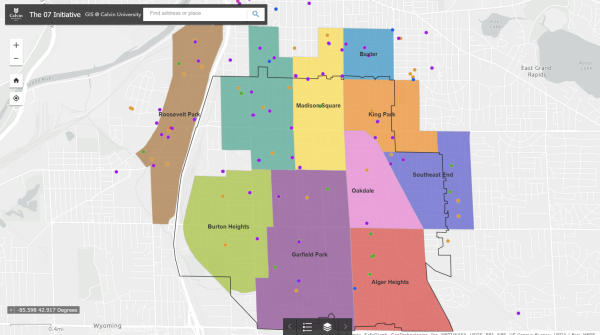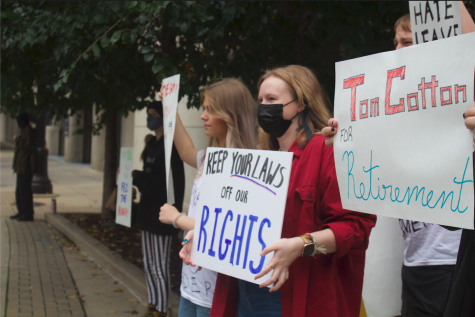Prison cuts force Grand Rapids to scale back prison reentry services
The state of Michigan cut funding for prison reentry programs by 37 percent, leading the city of Grand Rapids to significantly scale back its prison reentry program, which had previously been run through Pine Rest. Prison reentry programs help returning citizens transition back into society after completing their sentences.
“The city will have a scaled-down version [of the prison reentry program] with two staff members working out of the [department of human services] building on Franklin. Yet with 1,500-2,200 men and women being returned back to Kent and Allegan Counties that is hardly enough. The state cut the funding significantly for reasons beyond us,” said Cliff Washington, the former director of the prison reentry village.
The cuts come even though prison reentry programs have decreased the rate at which prisoners reoffend in the state of Michigan. From 1999-2002, 38 percent of returning citizens reoffended upon release from prison. By contrast, less than one in three returning citizens released between 2004-2007 reoffended.
Bryan Blakely, the director of Bates Place Ministries, a nonprofit that often partnered with Pine Rest’s prison reentry village to offer programming for returning citizens, explained how prison reentry programs help returning citizens stay on the right track upon release from prison.
“Prisoners need jobs, resources and housing. Without them, they get hopeless. So they come back into the city and can easily go back to the lifestyle they had before prison because of the hopelessness and lack of open doors.”
Many employers will not hire those who have criminal records, so finding a job can be especially difficult for the returning citizens. And without a job, they have no money for housing and other resources. According to Blakely, this proves especially problematic for long-term prisoners upon release, since many of them are no longer in contact with family and friends.
The Reentry Recycling Plant Project offered a solution to the problem by providing prisoners with a job at the recycling plant upon release from prison. Returning citizens enrolled in the program worked at the recycling plant for 32 hours a week at $8 an hour and met once a week to discuss their progress adjusting to life outside prison. Upon successful completion of the program, they were placed in permanent jobs. Unfortunately, this program, like the reentry village, ended in January due to loss of funding.
CLEAR, a support group for returning citizens through Bates Place Ministries and the Pine Rest prison reentry program, has the funding to continue operating until September 2014. However, beyond that point, its future is also uncertain.
Despite the success of prison reentry efforts, Washington says the budget cuts did not come as a surprise.
“Each year the state decreased the funding as we continued to provide services for more men and women. The bulk of funding is reserved to house those that have served time for [criminal sexual conduct] crimes because the state believes that group poses the greatest risk to public safety.”
Although both say the cuts are a big setback, neither Blakely nor Washington is giving up on prison reentry work in the Grand Rapids area.
Washington, who continues to work for Pine Rest in the human resources department, said, “I was involved in reentry long before the [Michigan Department of Corrections] had a program with such a name. As a result I will continue and forever be involved in reentry.”
One way Washington stays involved with prison reentry is through service as a board member at a number of nonprofits related to prison reentry, including Guiding Light Ministries and the Restorative Justice Committee of Kent County.
Blakely plans to look for private funding and grants to continue programs like CLEAR and the reentry village.
“We have to shift our interests and talk to people who are passionate about prison reentry and who care, because I don’t think the state will put money back in [prison reentry] again,” he said. “I hope that more of the community will take responsibility for these people in the future.”
Blakely made a special appeal to the church to not only offer financial support to these programs, but also to offer prisoners personal support as they work to adjust to life outside prison.
When the state is not able to continue support, “the church needs to pick up that role as the center of the community and restore [the prisoners] as members of the community,” Blakely said, adding, “We need to surround these people and help build them into the community with love — restore them to make society into a better place instead of shunning them.”
Washington echoed that sentiment. “Today, more than ever, we need members of the church to stand up and participate at a higher level. Who should know the meaning of forgiveness better than the church?”
In particular, Blakely hopes to see more people in the church community mentoring returning citizens.
“People want to be able to relate to someone in the community. They want to experience unconditional love and acceptance,” Blakely explained.
Those interested in supporting prison reentry programs financially or through volunteering should contact Bates Place Ministries for more information.







